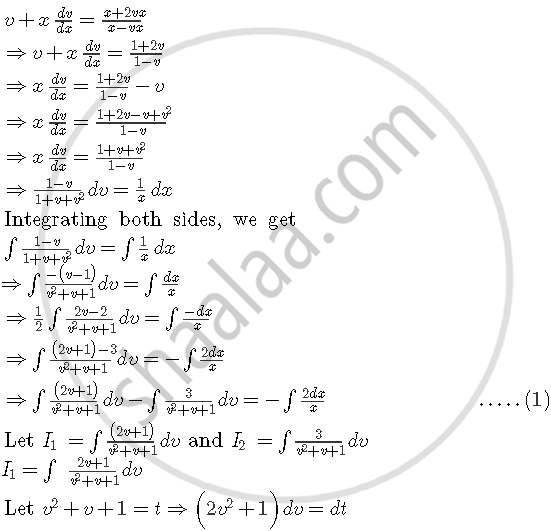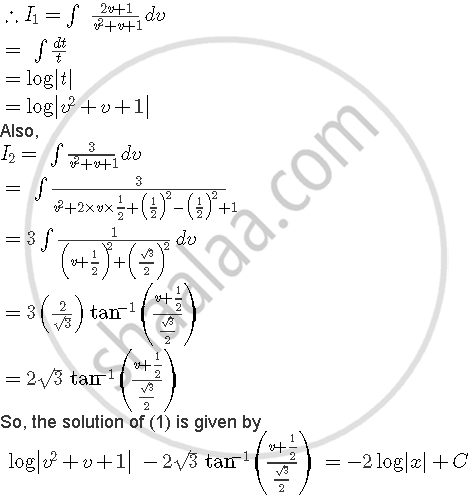Advertisements
Advertisements
Question
Find the particular solution of the differential equation `(x - y) dy/dx = (x + 2y)` given that y = 0 when x = 1.
Solution 1
`dy/dx = (x + 2y)/(x - y)`
Putting y = Vx


Solution 2
The given differential equation is
`(x - y) dy/dx = x + 2y`
`=> dy/dx = (x + 2y)/(x - y)`
This is a homogeneous differential equation.
Putting y=vx and `dy/dx = v + x dy/dx`, we get



RELATED QUESTIONS
Solve the differential equation :
`y+x dy/dx=x−y dy/dx`
Show that the differential equation `2xydy/dx=x^2+3y^2` is homogeneous and solve it.
Show that the given differential equation is homogeneous and solve them.
`y' = (x + y)/x`
Show that the given differential equation is homogeneous and solve them.
`x dy - y dx = sqrt(x^2 + y^2) dx`
Show that the given differential equation is homogeneous and solve them.
`{xcos(y/x) + ysin(y/x)}ydx = {ysin (y/x) - xcos(y/x)}xdy`
Show that the given differential equation is homogeneous and solve them.
`(1+e^(x/y))dx + e^(x/y) (1 - x/y)dy = 0`
For the differential equation find a particular solution satisfying the given condition:
(x + y) dy + (x – y) dx = 0; y = 1 when x = 1
For the differential equation find a particular solution satisfying the given condition:
x2 dy + (xy + y2) dx = 0; y = 1 when x = 1
For the differential equation find a particular solution satisfying the given condition:
`2xy + y^2 - 2x^2 dy/dx = 0; y = 2` when x = 1
A homogeneous differential equation of the from `dx/dy = h (x/y)` can be solved by making the substitution.
Which of the following is a homogeneous differential equation?
Solve the following initial value problem:
\[x e^{y/x} - y + x\frac{dy}{dx} = 0, y\left( e \right) = 0\]
Find the particular solution of the differential equation \[\left( x - y \right)\frac{dy}{dx} = x + 2y\], given that when x = 1, y = 0.
Show that the family of curves for which \[\frac{dy}{dx} = \frac{x^2 + y^2}{2xy}\], is given by \[x^2 - y^2 = Cx\]
A homogeneous differential equation of the form \[\frac{dx}{dy} = h\left( \frac{x}{y} \right)\] can be solved by making the substitution
Solve the following differential equation : \[\left[ y - x \cos\left( \frac{y}{x} \right) \right]dy + \left[ y \cos\left( \frac{y}{x} \right) - 2x \sin\left( \frac{y}{x} \right) \right]dx = 0\] .
Solve the following differential equation:
`(1 + 2"e"^("x"/"y")) + 2"e"^("x"/"y")(1 - "x"/"y") "dy"/"dx" = 0`
Solve the following differential equation:
`x * dy/dx - y + x * sin(y/x) = 0`
Solve the following differential equation:
`"x"^2 "dy"/"dx" = "x"^2 + "xy" + "y"^2`
Solve the following differential equation:
(9x + 5y) dy + (15x + 11y)dx = 0
Find the equation of a curve passing through `(1, pi/4)` if the slope of the tangent to the curve at any point P(x, y) is `y/x - cos^2 y/x`.
Which of the following is not a homogeneous function of x and y.
Solve : `x^2 "dy"/"dx"` = x2 + xy + y2.
Solcve: `x ("d"y)/("d"x) = y(log y – log x + 1)`
If a curve y = f(x), passing through the point (1, 2), is the solution of the differential equation, 2x2dy = (2xy + y2)dx, then `f(1/2)` is equal to ______.
